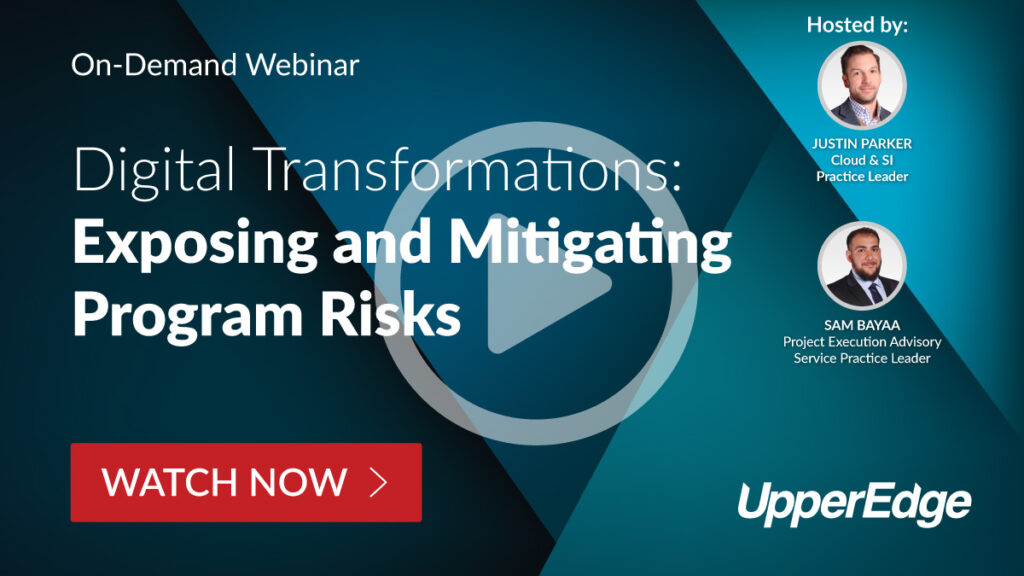- Ted Rogers
- Reading Time: 3 minutes

The gaps within your Transformation Program plan become apparent as your program begins to fail. Skipping steps in the implementation process can cost your company dearly. Here’s what to look for – and look out for – to prevent ERP project failures.
CEOs and CFOs are being held to greater account for the financial, operating, and brand damage that is being delivered by poorly executed ERP replacement initiatives – and this is not a new standard executives are being held to.
In fact, back in 2016, the CEO of Israel Chemical Limited (ICL) resigned in part due to the cost overruns associated with the company’s SAP deployment. The CEOs at Sleep Number and Hertz have had to personally step in to address flawed ERP and digital transformation initiatives. There have also been multiple class-action shareholder lawsuits against at least 7 past CEOs and CFOs of Revlon due to the material accounting practice weaknesses identified because of their SAP implementation.
The market is ruthless when ERP replacement projects fail, and CEOs are neglecting to protect shareholders from the risks that are clearly present. As a result, more CIOs are having shorter tenure, and their replacements are likely reporting directly to the CFO. Here is an overview of why ERP projects are failing and 5 questions to ask when selecting a Systems Integrator.
What Causes ERP Project Failures and What’s Missing to Help Them Succeed?
As cost pressures increase and rapid time to deployment is required to meet competitive pressures, companies are skipping or failing to identify steps in their implementation process, steps that have been around for ages. These gaps are likely the results of:
- The adoption of agile, which tends to be more focused on the delivery of code vs. the delivery of change
- System Integrators (SIs) looking for ways to lower costs or vendor risk on the initial estimate, proposing a “standard out of the box functionality” solution (often referred to as “fit to gap”) without considering enterprise unique and strategic business processes
- Generational change where experienced executives are replaced by new up-and-comers unfamiliar with the type of complexity management these programs require
From reviews of RFP responses to large transformational programs and in-depth analysis of project failures, here are the most common gaps in program plans:
- Planning for the Adoption and Validation of Internal Audit Controls: Almost every RFP response I have seen fails to incorporate project processes or time allocation to account for internal audit review and sign-off on controls.
- Identification and Implementation of Business Process Performance Metrics: Without the availability of these performance metrics, organizations often fail to realize that the business is not operating at the levels anticipated. This causes backups and business process failures due to unanticipated workload.
- Solution Integrity Validation Checks: Every proposal typically includes the development of business process tests and the implementation of data quality load checks, but many fail to account for holistic integrity validation tests. These tests confirm that the solution as a whole is producing the anticipated results. Tests similar to parallel payroll, inventory costing comparisons, and promise data correlation are deemed too difficult, time consuming or costly to incorporate.
- Process and Business Management Training: Training gets focused on the use of transactions and confirmation that users understand how to use them. What is often missing, however, is training on when to use new capabilities, and more importantly, what to do with novel business problems that require management intervention.
- Failure to Adjust Internal Business Incentives to Align with New Ways of Operating the Business: Management rewards that are focused on minimizing inventory and manufacturing costs may be in direct opposition to process changes that are designed to significantly reduce time to market or delivery lead times.
Selecting a Systems Integrator: 5 Questions to Ask
As CEOs and CFOs move through the process of selecting an SI to assist them in their transformational journeys, they should ask the following five questions:
- Can you describe the portions of your methodology that will be implemented to ensure and confirm the operational integrity of the organization (taking orders, shipping product, paying bills, receiving payment, and reporting accurately)?
- How does your estimate account for complex business processes within our enterprise that provides us unique strategic differentiation, and what exactly are those business processes you predict will be of concern?
- How will the program engage the general management of the organization to efficiently manage the business to both capture the anticipated benefits and address any process performance failings?
- If the implementation involves multiple deployments, what steps will the team take to design, implement, test, and control any interim state processes?
- If an independent third party were to review the plan and approach proposed, what gaps might they find, and why?
It is highly probable that SIs faced with these questions will need to revise their proposals to address the specific risks that have been called out. And these revisions will likely result in proposed cost increases. However, I think every CEO and CFO would agree that they would much rather pay the cost of problem prevention than suffer the potentially catastrophic consequences of problem realization.

